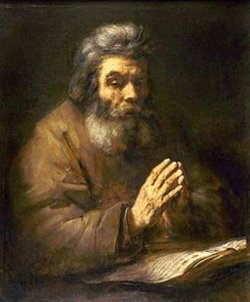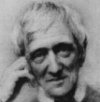
The "Our Father"Mt 6,9-15 Luke 11,2-4
We find the "Our Father", 'Our Lord's Own Prayer', both in the Gospel of Matthew and in the Gospel of Luke. It is obvious that these passages are closely related to one another. Let us therefore examine, very closely all the characteristics of the two texts that could help us to determine how these two versions of the 'Our Father' came about. Of course, in these few pages we cannot possibly go into all details (whole books have been written on the matter), but we may try to take a few of the more obvious features that can easily be understood. We will approach the text in a scientific way. This means that we will begin by making OBSERVATIONS, features of the texts that we can observe with the help of various sciences. From a study of our observations, we will proceed to formulate a SCIENTIFIC HYPOTHESIS regarding the formation of these texts. We will then show how this scientific hypothesis leads us to important EXEGETICAL CONCLUSIONS as to the meaning ot the texts.
|
|||||||||||||||||||||||||||||||||
1. First observation.The Greek Texts of Matthew's and Luke's "Our Father" have so much
in common that they must derive from one common Greek source.
|
| Matthew 6,9-13 |
Luke 11,2b-4 |
|---|---|
|
Our Father who art in the heavens,
|
Father, |
|
Your name be sanctified. |
Your name be sanctified. |
|
Your kingdom come . |
Your kingdom come. |
|
Your name will be done as in heaven so also
on earth. |
|
|
Give us this day our daily bread.
|
Keep giving us from day to day our daily bread. |
|
And forgive us our debts as we also
have forgiven our debtors. |
And forgive us our sins for we ourselves too forgive veryone who is our debtor. |
|
And lead us not into
temptation |
And lead us not into temptation |
|
but deliver us from evil. |
(a) The words that are in italics, are absolutely identical in Greek. In fact, we find the following statistical data about the use of words:
|
Identical |
Almost identical |
Different |
|
|
Matthew's Our Father total 58 words |
25 words |
7 words |
26 words |
|
Luke's Our Father total 38 words |
25 words |
10 words |
3 words |
This means that more than half of the Greek words are identical!
b) Moreover, the words in question are not such as do normally occur in Greek. The expression 'Your Name be sanctified', e.g. is so unusual in Greek and the construction employed so rare, that it becomes clear that the two identical formulations must go back to one Greek original.
c) Absolutely conclusive is the word used for "daily" in "daily bread". The Greek term is ''epiousion". It is the only time that this word occurs in the Bible. Moreover, in all the thousands of Greek writings that are known to us the word has been found only in one single text (of uncertain date). The word was so strange that the Fathers of the early centuries do not agree on its meaning. Some say that it should mean, "daily", others, "necessary". Yet the word is undoubtedly a Greek word, composed from the Greek words 'epi' and 'ousios'. The fact that we find this same, identical term in both versions proves that both go back to one Greek original.
Example. Suppose that two schoolboys have to write an essay in English. Half the words they use are identically the same .They employ some rare expressions. Moreover, both use a word like 'membranaciousness'. We will then conclude that both derived their essay from one and the same English text which they partly copied.
We observe, therefore, that the two versions of the 'Our Father' presuppose one common Greek source from which they were derived.
In this observation we learn from what linguists tell us,
a) Many of the thoughts in the "Our Father" can only be understood fully against the background of Jewish belief.
These typically Jewish thoughts argue to an original Aramaic (Jewish) version of the Our Father'.
b) The constructions used in the Our Father' also point to an Aramaic original. To limit ourselves to one example, in Greek the verb follows on the subject. In Aramaic, however, the verb begins certain sentence constructions.
In Aramaic one says: יתקדש שמך תבא מלכותך
yithqaddesh (be sanctified) shemekha (your name) tabho (let come) malkuthekha (your kingdom).
The Greek version is: Αγιασϑητο το ονομα σου ηλϑατο ‘η βασιλεια σου
It follows the same order as the Aramaic whereas it should be in the inverted order according to normal Greek grammar.
hagiastheto (be sanctified) to onoma sou (your name) elthato (let come) he basileia sou (your kingdom)
An Aramaic original has, obviously, just been translated word for word into Greek!
c) The phrase 'Your Name be sanctified' makes no sense in Greek. According to the Greek words it would express the wish that God's name (which so far has been unholy) be purified and cleansed. But in Aramaic (as in Hebrew) the phrase is an idiomatic expression which has a very precise meaning. The "name" stands for the person himself/herself. When God says, "I will sanctify my Name" (Ezekiel 36,23), it means, I will prove myself to be holy by my deeds In Aramaic the phrase expresses, therefore, "God, may your holiness be shown in your deeds." Again an indication of the fact that the original must have been spoken in Aramaic.
Example. Suppose you find in an English book a story with lines such as these, "While Uncle Moon was shining bright, Lalitha, said to Nageswarrao, 'Husband, tomorrow to your elder brother let us go'." We know immediately that the original story was in Telegu. Because the thoughts are so Telegu, Uncle Moon (Chendra Mama); saying 'husband' instead of calling him by his name; speaking of the 'elder brother' (anna). Also the construction of the last sentence is Telugu, not English.
Consequently, we observe that an Aramaic original underlies the Greek text of the "Our Father".
To hear what the Our Father in Aramaic sounds like, click on the video below:
MATTHEW wrote his Gospel for Jews.
 |
|---|
| Transcendent God by Pdadosky |
'OUR FATHER WHO ART IN THE HEAVENS' is an appellation very congenial to the Jewish way of praying. They used to call God 'Father', but always added another title to bring out the difference between God, the all-transcending Father, and human 'fathers' on earth.
Matthew tberefore makes Christ recite the prayer as we should say it. That is why we read our Father. That is why we say, 'who art in the heavens'. Almighty God was 'Father' to Jesus in a far more intimate sense than God is 'Father' to us, according to Matthew.
"YOUR WILL BE DONE AS IN HEAVEN SO ALSO ON EARTH".
This is an explanatory phrase added by Matthew. Why? God's kingdom is in heaven. There God's almighty will is completely achieved. When Christ said, 'Your kingdom come", he wanted to say precisely that 'God's Will be done on earth'. In other words, "your will be done" explains the meaning of 'your kingdom come'. This explanation was necessary for Jews. For the Jews were expecting a political kingdom that would liberate them from Roman rule. Christ did not mean this when saying 'Your kingdom come'. When Matthew added the explanatory phrase which was so necessary for the Jews, he followed accurately Christ's mind, if not his actual words.
LUKE wrote his Gospel for converted Greek-speaking (Hellenist) Christians.
 |
|---|
| God as the loving father
welcoming the prodigal son by Rembrandt 1628-69 |
'FATHER'. Jesus prayed to God with the simple appellation 'father' thereby expressing a personal relationship that no Jew of his time would dare to express. The Aramaic Abba means: 'Dad'.
Christ speaks about God as "my Father" (Luke 10,22; Matthew 20,23; 25,34; 26,29, 53).
Through Christ all Christians have become God's children in a special way. That is why all can say, "Abba, Father" when praying (Romans 8,15; Galatians 4,6).
Luke, consequently gives the "Our Father" as it was recited by the early Greek speaking Christians with Christ's own appellation. Luke also explains things to non-Jews by saying 'SINS' instead of 'debts' and by explaining that we are asking not only for today but for food enough for each day, "KEEP GIVING US FROM DAY TO DAY". He stresses that we should forgive "EVERYONE".
From these considerations it becomes clear to us why Matthew's and Luke's versions are different in some details. The meaning of both versions is the same, but we find a difference in stress and formulation on account of the different audiences to which the texts are addressed.
LUKE introduces the "Our Father" in this way:
"Once he was somewhere engaged in prayer. When he had finished, one of his disciples said to him 'Lord, teach us how to pray, just as John taught his disciples'.
He said to them, 'When you pray, say as follows: 'Father' etc."
Luke 11,1-2
There is no reason to doubt the accuracy ot this information. Jesus always taught in this fashion. Whenever a certain matter arose (the occasion) Jesus would speak his mind on the subject in a brief and short oracle (Jesus' word). This 'word [logion] would then be explained by him at length (the instruction) the most important thing was Jesus' word itself, this the disciples would learn by heart.
The occasion and the explanatory instruction have also been retained at times, but not always. In this instance Luke has preserved for us the occasion of Jesus' teaching the "Our Father" (Luke 11,12).
The occasion given by Luke is of great importance. We learn from it that Jesus meant the 'Our Father' to be a real model of prayer.
MATTHEW and MARK, however, do not give the occasion, but combine the prayer with Christ's statement on forgiveness.
| Mark 11,25 | Matthew 6,9-15 | |
|---|---|---|
|
"Whenever you stand up
saying your prayer, forgive whatever you may have against another person.
|
vs. 9-13
"In this way you shall pray: Our Father, who art . .
.forgive us our debts as we have also forgiven our debtors . . . and deliver us
from evil'! |
|
|
Then your Father who is in
the heavens will also forgive your sins". |
vs. 14-15For if you forgive people their sins, your heavenly Father
will forgive you also. But if you do not forgive people, your Father will not
forgive your sins either". |
When Christ was giving his explanatory instruction, he would explain each of the petitions in the "Our Father". The statement on forgiveness recorded here, undoubtedly originated in this way. Since both Matthew and Mark connect the 'prayer' with the statement on forgiveness, we may conclude that this connection came about in oral tradition. Mark omits the 'Our Father', probably because it was so well known to Christians, but he retains the statement on forgiveness. Matthew gives both together as he found it in oral tradition.
We observe, therefore, that Jesus' prophetic word (the 'Our Father' itself) was preserved by Matthew and Luke. Luke, moreover, retained the occasion (the disciple's question). Matthew and Mark add a part of Christ's explanatory instruction (the part on forgiveness), according to a connection that existed already in oral tradition.
It is obvious that the 'Our Father' did not originally belong to the text of the Sermon on the Mount (Matthew chapters 5-7). We have already seen in the fourth observation that Luke provides the actual historical occasion. That the 'Our Father' was added to the Sermon on the Mount at a later stage can also be shown from Matthew's Gospel itself. This is proved by the fact that it interrupts another statement of Christ.
| General theme | Mt 6,1 | "Do not practise your religion before people . . ." |
|---|---|---|
| secret virtue first example |
Mt 6,2-4 | "When you are about to give alms, do not send a trumpeter ahead of you... Thus your alms should be given in secrecy. Then your Father who sees what is secret will reward you!" |
| secret virtue second example |
Mt 6,5-6 | "Again, when you pray, do not be like the hypocrites... Pray to your Father in secrecy. Then your Father who sees what is secret will reward you!" |
| Interruption 1 | Mt 6,7-8 |
Don't pray with many words,
etc. |
| Interruption 2 | Mt 6,9-13 |
the Our Father |
| Interruption 3 | Mt 6,14-15 |
statement on forgiveness
|
| secret virtue third example |
Mt 6,16-18 | "Again when you fast do not imitate the gloomy-looking hypocrites... Your Father will notice your fasting in secrecy. Then your Father, who sees what is secret, will reward you!" |
In other words, Matthew 6,1-18 was originally one prophetic statement of Jesus against hypocrisy, containing three examples of secret virtue: almsgiving, prayer and fasting. The texts of Matthew 6,7-15 were inserted here (interrupting the oracle) since they also speak of prayer (as vs. 5-6 do). In this way Matthew has added many teachings of Jesus which he knew from other traditions, to the original text of the Sermon on the Mount.
If we inspect the Gospel of Luke, we observe that this evangelist too has tried to bring order in Christ's teachings by collecting similar passages - on prayer - under the same heading.
|
Luke 11,1-2a |
occasion of the 'our Father' | |
|---|---|---|
|
Luke 11,2b-4 |
the 'Our Father' itself |
parallel in Matthew 6,9-13 |
|
Luke 11,5-8 |
parable about the importuning friend | |
|
Luke 11,9-13 |
statement on the efficacy of prayer |
parallel in Matthew 7,7-11 |
The last of these passages has been put by Matthew in the Sermon on the Mount, whereas Luke puts it into his collection of texts on prayer.
From these facts we learn that connections between various Gospel passages may have different origins:
Having made our 'scientific' observations about the Our Father, we can now proceed to reconstruct its history. This reconstruction may be considered as quite certain, except for the precise dates.
|
27-30 AD |
At the request of the disciples (Luke 11
,1-2) Jesus taught the Our Father in Aramaic. We call this the Aramaic
Original of the Our Father. Jesus used the opportunity also to teach
certain aspects of prayer (e.g. that we have to forgive others). |
|---|---|
|
30-50 AD |
The apostles had learned the Our Father by
heart. After the resurrection they taught it to the new disciples who were
converted to Christ. So the Aramaic Original was handed on in oral
tradition. The apostles taught it, together with the occasion at which
Jesus had formulated it and His teaching on prayer. |
|
ca. 50 AD |
In the Aramaic edition of
Matthew's Gospel the Our Father got its place in the Sermon on the
Mount. As the Gospel was addressed to Jews, the Our Father received its
typically Jewish formulation. Matthew preserved the link with the forgiveness
text (Matthew 6,14-15). |
|
ca. 64 AD |
In Mark's Gospel the Our
Father itself is not mentioned, perhaps because Mark presupposed it as a text
every Christian knew. The forgiveness text is given however (Mark 11,25).
|
|
ca. 70 AD |
Meanwhile the Aramaic text of the Our
Father had been translated into Greek for the use of the Greek converts. This
Greek version of the Our Father was known to the translator
who translated the Aramaic Matthew producing socalled Greek
Matthew. Also Luke knew the Greek version of the Our
Father. He adapted it to a form intelligible to new hellenistic (Greek
speaking) converts and put it together with other texts on prayer. |
In the early Church an extended form of the Our Father became known as we know from the socalled "Didache [= teaching] of the Twelve Apostles". The form is the same as the one we find with Matthew except for some addition at the end.
"Thus you shall pray,
'Our Father who art in heaven.
Your Name be sanctified!
Your Kingdom come.
Your Will be done on earth as in heaven!
Give us this day our daily bread.
And forgive us our debts, as we also forgive our debtors.
And lead us not into temptation, but deliver us from evil.
For Yours is the Power and the GIory through the ages'.
Three times a day you shall pray in this fashion".
Another form of the Our Father is found with Marcion (2nd century AD). It is based on Luke's version, but with some free adaptations which show that the early Christians still expressed the Our Father in their own words.
"Father,
Your Name be sanctified!
May your Holy Spirit come on us and purify us!
Keep giving us from day to day your daily bread.
And forgive us our sins, for we ourselves too forgive everyone who is our debtor.
And do not permit us to be led into temptation."
Question: Which of the two "Our Fathers" should we use for our daily prayer? The one found with Matthew, or the one in Luke's Gospel?
 |
|---|
| by Rembrandt |
It is tragic that Christians normally consider the "Our Father" as a prayer formula, a set piece to be used for daily prayer. Already the Didache, an ancient tract on Christian sanctity, presupposes this attitude when it says that this prayer should be said "three times a day" (see above). Since then it has been used as a prayer 'learnt by heart' and recited in a fixed formulation!
But was this Christ's idea? Surely not! The Apostles did not ask to be taught an oration. They asked, "Lord, teach us how to pray!" They begged him to teach them a general method of praying, to show them a pattern that they could follow. With the words of the "Our Father" Jesus responded to their request by giving them an example. Following this example the disciples should make up their own prayer.
According to the pattern of the "Our Father" they should
The very fact that Matthew's and Luke's form are different underlines this aspect of the "Our Father." It is the spirit, the substance, the meaning of the Our Father they want to pass on, not the external formulation! Both Matthew and Luke teach us complementary aspects of this 'pattern of prayer' left by Our Lord.
Praying the "Our Father" does, therefore, not mean "reciting the words of Christ by heart". Praying the "Our Father" means, praying according to Christ's pattern in our own words.
Free, up-to-date example of the "Our Father" pattern of prayer:
"Father, you are worthy of all honour, praise and glory!
May your plan of salvation benefit people in the whole world! May all people get to know you as their Creator and their loving Father!
Father, help us in our daily needs. Give food to the hungry; give work to the unemployed; support the poor and the lonely.
Please, forgive me my sins. I know that you demand charity from me and that I cannot be your friend if I live in enmity with others. I realize that I should be merciful towards others just as you are towards me.
I realize my weakness. I know that I often fall in temptation. Please, give me the strength to live up to my good resolutions and keep me far from what may harm me."
If we say the "Our Father" in such a personal way. then we do what Christ told us to do, "In this way you should pray..." (Matthew 6,9; Luke 11,2)

Much of the text in our course Interpreting Scripture Correctly is based on publications by John Wijngaards, in particular,
Illustrations in the video clip by Jackie Clackson.
 |
 |
 |
 |
 |
|
|---|---|---|---|---|---|
| Facts |
 |
 |
 |
 |
|||